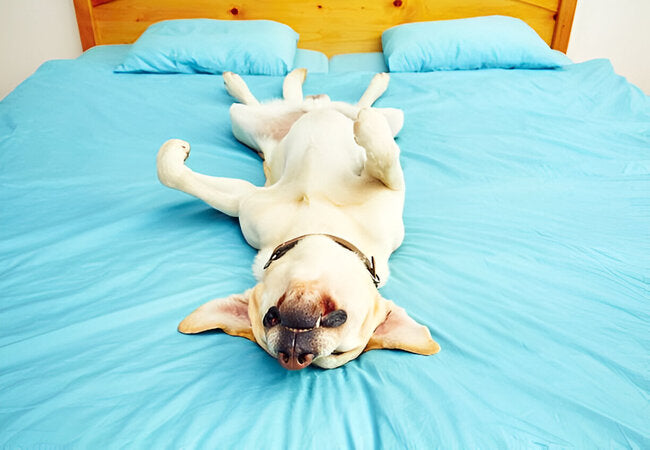Why Dogs (and Puppies) Lose Sleep – Vet‑Approved Guide to Sleepless Nights in 2025 🐶🌙

In this article
Why Dogs (and Puppies) Lose Sleep – Vet‑Approved Guide to Sleepless Nights in 2025 🐶🌙
By Dr. Duncan Houston BVSc
Sleepless nights aren’t just human territory. Whether it's the puppy whining in the wee hours or an older dog pacing restlessly, nighttime disturbances can stem from many medical and behavioral causes. In this comprehensive 2025 guide, we’ll explore why dogs lose sleep, how to diagnose the underlying issues, and discover vet-backed solutions to help your canine companion—and you—rest easy. 😴🐾
1. 🐾 Puppy Whines & Nighttime Calls
Newborn puppies are used to cuddling with their littermates and mom. Moving to a new home can leave them anxious and lonely, leading to crying at night, similar to human infants.
- Crate-side snuggles: During the first few nights, placing the crate near your bed helps reduce separation distress.
- Pre-bed potty & exercise: A short outing and some gentle play before bedtime help tire them out and reduce middle-of-night accidents.
2. 🧠 Pain, Anxiety, or Cognitive Dysfunction (Sundown Syndrome)
Older dogs may pace, whine, or reverse sleep-wake cycles due to pain (arthritis), cognitive decline, or anxiety-related insomnia.
- Insomnia in dogs: Caused by pain, anxiety, itching, or cognitive dysfunction.
- Dementia symptoms: Older dogs may wake at night, wander, and soil inside due to disorientation.
3. 😧 Sleep Disorders: Apnea, Narcolepsy & REM Behavior
Though rare, conditions like sleep apnea, narcolepsy, or REM behavior disorder can disrupt sleep:
- Sleep apnea: Common in brachycephalic dogs; loud snoring and waking episodes are red flags.
- Narcolepsy: Sudden collapses or sleep during excitement may appear in young dogs.
- REM behavior disorder: Physical movements like barking or thrashing during dreams may disrupt both their sleep and yours.
4. 🌪️ Stress, Environment & Disturbances
Routine changes, schedule shifts, loud noises or even traveling can trigger stress and interrupted sleep:
- Anxiety: Life changes like moving homes or adding household stress can keep dogs awake.
- Environmental triggers: Nighttime noises, family movement, or unfamiliar surroundings disrupt rest.
5. 🛏️ Bedtime Routine & Environment Matters
Establishing a consistent nightly schedule is vital:
- Exercise before dark: A final walk or play session before an hour of calm helps prime sleepiness.
- Calm-down period: Avoid overstimulation right before bed—no loud games or TV.
- Crate training: Use the crate properly—not as punishment, but a safe den-like space.
- Comfort aids: Apply pheromone sprays, white noise, night-light, or Thundershirt to soothe anxiety.
6. ✅ Health-Based Interventions
If you suspect illness, get a vet check:
- Pain screening (arthritis, injuries)
- Neurological checks (for narcolepsy or cognitive dysfunction)
- Allergy/itching assessment
- Breathing evaluation, especially in flat-faced breeds.
Medication such as NSAIDs, trazodone, gabapentin, or supplements like melatonin or valerian may help—but only under vet guidance.
7. 🧩 Rebuild Routine & Comfort
- Step 1: Evening walk/play → calm wind-down → crate time
- Step 2: Ensure last-minute potty before lights out
- Step 3: Use white noise or a diffuser in the bedroom
- Step 4: Address medical or behavioral needs as required
- Step 5: Track nighttime behavior and adjust with vet as needed
8. 📝 Quick Reference Table
| Cause | Signs | Vet‑Backed Solution |
|---|---|---|
| Puppy anxiety | Whining/cries early nights | Crate near bed, potty before bed, calm games |
| Pain/Cognitive issues | Pacing, disorientation, waking at night | Vet exam, pain meds, supplements, routine |
| Sleep disorders | Loud snoring, collapsing, thrashing dreams | Breed-specific exam, possible meds, airway support |
| Stress/environment | Jumpiness, whining with noise/travel | Pheromones, safe zone, noise control |
9. 📱 Ask A Vet App 2025 Support
Need help diagnosing or repairing sleepless routines?
- 📹 Send night-time video for vet evaluation
- 🧩 Receive tailored plans including meds, calming aids, crate training schedules
- 💬 Connect live with professionals to optimize your dog's night-time care
❤️ Final Thoughts
It’s never just “bad sleep.” Night waking in dogs can highlight anxiety, discomfort, health issues, or developmental phases. By understanding the root causes, establishing calming routines, and using vet-guided interventions, you can restore peaceful nights for both you and your pup. In 2025, let's value canine rest as much as their daytime joie de vivre. Goodnight to you both! 🌜🐾
Need personalized night‑time support? Visit AskAVet.com or download the Ask A Vet app for expert guidance tailored to your dog’s sleep needs.






